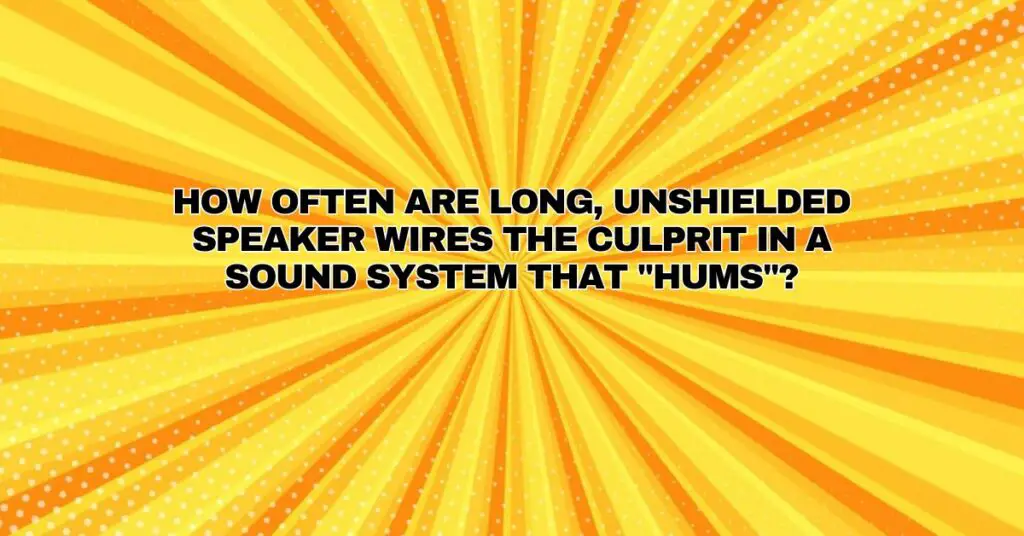A humming sound in your sound system can be a perplexing and frustrating issue. While there are numerous potential causes, one common question that arises is whether long, unshielded speaker wires are often the culprit behind this unwanted noise. In this comprehensive article, we will delve into the role of speaker wires, the impact of their length and shielding, and how often they are responsible for the hum in a sound system.
The Role of Speaker Wires
Speaker wires are an essential component in any audio system. They serve as the conduit for the electrical signal to travel from the amplifier or receiver to the speakers, translating the electrical energy into audible sound. The quality of these wires can significantly impact the audio quality, but their impact on hum issues is often misunderstood.
Potential Causes of Hum in Sound Systems
Sound systems can experience hum for a variety of reasons, and while speaker wires can contribute to the problem in certain situations, they are not always the primary culprit. Common causes of hum in sound systems include:
- Ground Loops: Ground loops are a frequent cause of hum. They occur when there is a difference in electrical potential between various components in an audio system, creating a circular path for electrical interference. Ground loops are typically associated with a low-frequency hum.
- Electromagnetic Interference (EMI): External sources of electromagnetic interference, such as Wi-Fi routers, electronic devices, or power sources, can introduce unwanted signals into the audio system, leading to hum.
- Cable Quality: The quality of all cables, including speaker wires, can influence the potential for interference. Low-quality or damaged cables may not shield the audio signal adequately, making them more susceptible to interference.
- Poor Connections: Loose or improperly connected cables and components can introduce noise into the audio system. Ensure that all connections are secure and properly seated.
- Power Supply Issues: Inadequate or fluctuating power supply can contribute to hum by introducing irregularities in the electrical current sent to the audio components.
Impact of Long, Unshielded Speaker Wires
Long, unshielded speaker wires can potentially contribute to hum issues in a sound system, but their role should not be overemphasized. The key factors related to long, unshielded speaker wires and their potential impact on hum are:
- Resistance: Longer speaker wires introduce higher resistance, which can affect the overall impedance of the system. This can cause a drop in power delivery to the speakers, potentially leading to a hum issue, especially at high volumes.
- Inductance: Longer wires exhibit increased inductance, which can lead to a high-pass filter effect. This may result in the attenuation of low-frequency signals, contributing to a hum.
- Shielding: Unshielded wires are more susceptible to picking up external interference, such as EMI or radio frequency interference (RFI). This susceptibility can introduce noise into the audio signal, potentially manifesting as hum.
Diagnosing and Resolving Speaker Wire-Related Hum
To address potential hum issues related to long, unshielded speaker wires, consider the following steps:
- Check Connections: Ensure that all connections involving the speaker wires are secure and properly seated. Loose or improperly connected wires can introduce noise.
- Minimize Length: If possible, reduce the length of the speaker wires to minimize their resistance and inductance. Shorter cables are less likely to introduce hum issues.
- Upgrade to Shielded Cables: Consider using shielded speaker cables, especially if your sound system is positioned near potential sources of interference. Shielded cables can effectively reduce the impact of EMI and RFI.
- Proper Cable Routing: Carefully route the speaker wires, keeping them away from potential sources of interference, such as Wi-Fi routers, fluorescent lights, or electronic devices.
- Professional Assistance: If you’ve exhausted all troubleshooting options and the hum persists, consider consulting a professional audio technician or specialist who can diagnose the issue and provide tailored solutions.
Conclusion
While long, unshielded speaker wires can potentially contribute to hum issues in a sound system, they are not always the primary culprit. Hum in sound systems can result from a wide range of causes, including ground loops, electromagnetic interference, cable quality, poor connections, and power supply issues. It’s crucial to consider these factors collectively when diagnosing and resolving hum issues in a sound system. By addressing the potential sources of interference, ensuring secure connections, and using shielded cables when necessary, you can enjoy a clean and pristine audio experience, free from the disruptive effects of hum.


